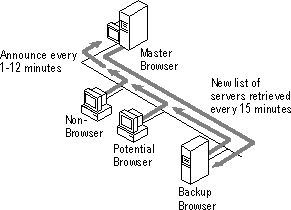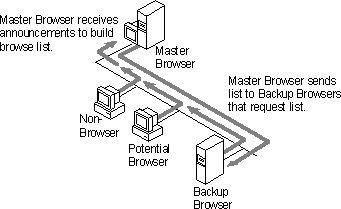
The Browser service must be notified by a resource when it is available for use on the Windows NT network. When a network computer running Windows for Workgroups, Windows 95, Windows NT Workstation, or Windows NT Server starts, it sends an announcement to the Browser service that it is an available resource.

Figure 3.3 Browser announcements
Master browsers are responsible for receiving announcements from computers running any of the following software.
Master browsers also return lists of backup browsers to computers running any of the following software.
When a computer starts and its MaintainServerList parameter is set to Auto, the master browser is responsible for telling the system whether or not to become a backup browser.
When a computer becomes the master browser by winning an election, and the browse list is empty, the master browser forces all systems to announce. The master browser broadcasts a RequestAnnouncement datagram. All computers that receive this datagram must answer randomly within 30 seconds. This 30-second range for response prevents the master browser from becoming overloaded and losing replies, and protects the network from being flooded with responses.

Figure 3.4 Browsing for Backup Lists
A master browser cannot be forced to rebuild the browse list for a workgroup or domain. However, shutting down and restarting a computer that is configured as the preferred master browser, or stopping and restarting the Browser service, forces the build of a new browse list. When a preferred master browser starts, it forces an election, which it will win. Because there is no browse list, it then forces all members of the domain or workgroup to announce themselves.
If a master browser receives an announcement from another computer that claims to be the master browser, the master browser will demote itself from master browser and force an election. This ensures that there is never more than one master browser in each workgroup or domain.